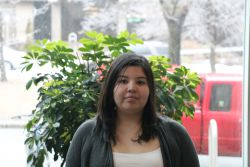Halifax Media Co-op
News from Nova Scotia's Grassroots
"I was taught not to touch the water."
Vanessa Gray, from Aamjiwnaang First Nation, is first in series of Front line Communities interviews
K'JIPUKTUK (HALIFAX) - Vanessa Gray, from the community of Aamjiwnaang First Nation, near Sarnia, Ontario, is the first in a series of interviews of Indigenous women across Turtle Island (Canada) living in 'Front line' communities.
Aamjiwnaang is bordered by dozens who high emission facilities, including refineries that deal with tar sands bitumen.
Scientific studies have also found high concentrations of contaminants in the soil and sediment on reserve land.
Other studies have found that in recent years there has been a sharp decrease in male child births; the ratio of female to male births is now about 2 to 1, a level not replicated elsewhere in the world.
In the following interview, Gray discusses the realities of living in a community where the natural landscape - and the health of the environment - has been drastically altered by industrial incursion.
"Children that I went to daycare with all had asthma and all required puffers," says Gray. "Children and adults still suffer with the ability to breathe and rely on puffers to get through the day.
"That's something all three of us, my brother, my sister and myself have dealt with growing up; struggling for air to breathe. I remember we were lining up in the kitchen when it was time to take the puffer, so there was the three of us, and my mom would give us the puffer each and we would be off."
Please enjoy the following interview with Vanessa Gray.
For more information on Aamjiwnaang solidarity, click here.
The site for the Halifax local of The Media Co-op has been archived and will no longer be updated. Please visit the main Media Co-op website to learn more about the organization.



